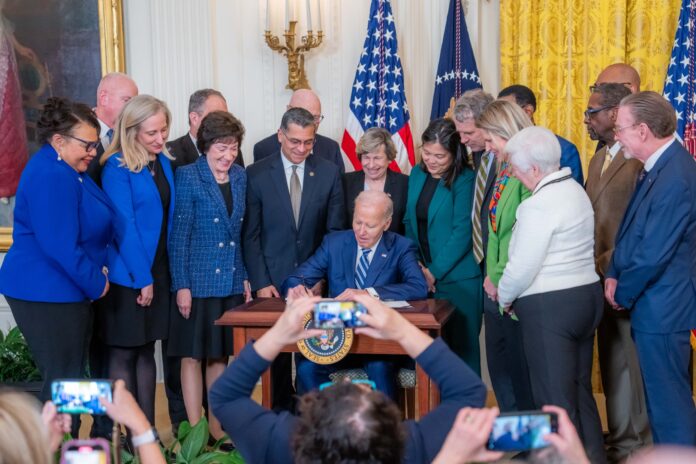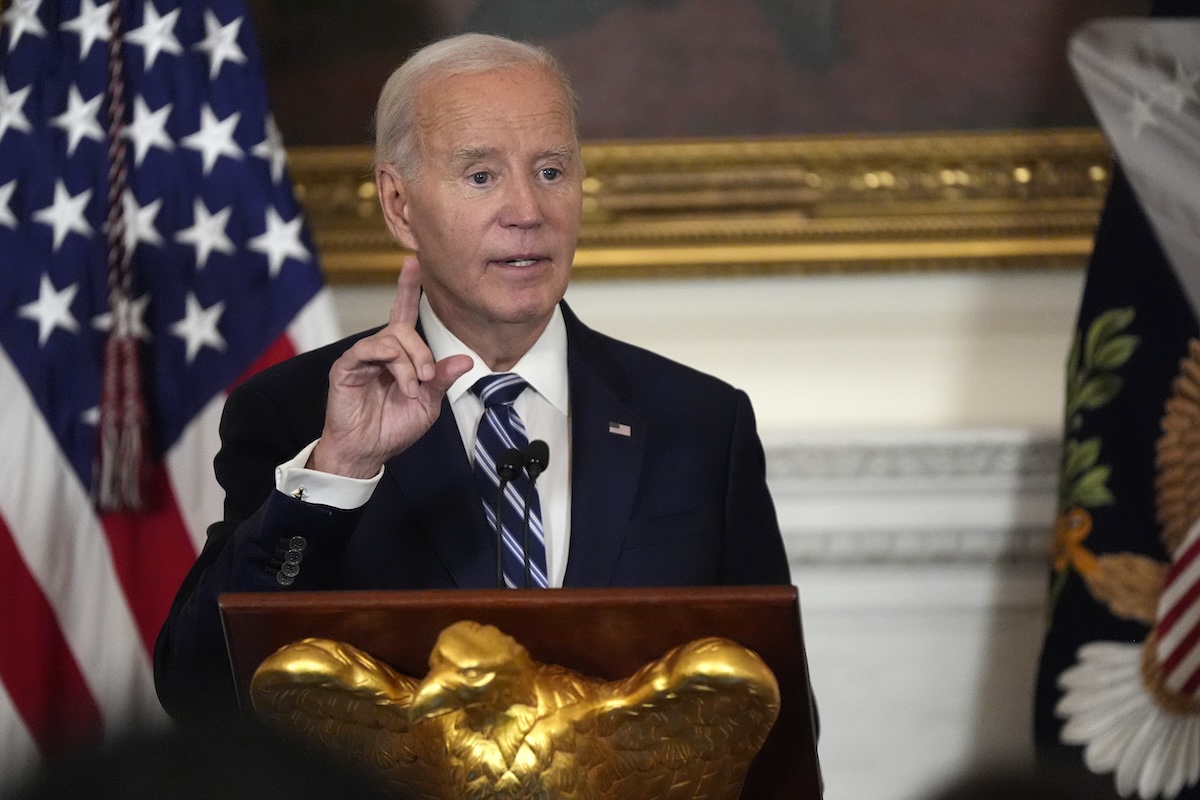WASHINGTON (States Newsroom) — Lawmakers certified President-elect Donald Trump’s win Monday in a smooth process that four years ago was disrupted by a violent mob of Trump supporters bent on stopping Congress from formally declaring President Joe Biden’s 2020 victory.
Vice President Kamala Harris — the 2024 Democratic presidential nominee defeated by Trump — presided over the afternoon joint session. Senators and representatives counted and certified the 312 Electoral College votes for Trump that secured his second term in office, this time accompanied by Sen. J.D. Vance of Ohio as his vice president.
“Today was obviously a very important day. It was about what should be the norm and what the American people should be able to take for granted, which is that one of the most important pillars of our democracy is that there will be a peaceful transfer of power,” Harris, who won 226 Electoral College votes, told reporters after lawmakers concluded the ceremony.
The process wrapped up in just under 40 minutes with no objections — a stark contrast to four years ago, when Republicans objected to Arizona and Pennsylvania results, and Trump supporters breached the Capitol, sending lawmakers into hiding for several hours.
Former Vice President Mike Pence said Monday in a statement published on X that he welcomed “the return of order and civility to these historic proceedings.”
“The peaceful transfer of power is the hallmark of our democracy and today, members of both parties in the House and Senate along with the vice president certified the election of our new president and vice president without controversy or objection,” wrote Pence, who in 2021 resisted intense pressure from Trump to stop Congress from certifying the results.
On that day, the rioters chanted “Hang Mike Pence” and erected a makeshift gallows on the west side of the Capitol.
Inside the House chamber
Harris entered the chamber just before 1 p.m. Eastern on Monday, with senators following in line behind her.
Lawmakers read aloud the Electoral College vote totals for each state. Harris stood at the dais as results were reported, including the states she and running mate Minnesota Gov. Tim Walz won.
Of the 538 Electoral College votes, at least 270 are needed to win.
Lawmakers on each side of the chamber applauded, and some even stood, when vote totals were announced for their party’s candidate.
Vance, sitting beside GOP Sen. Bill Cassidy of Louisiana, applauded during the reading of votes.
Ahead of Monday’s certification, Democratic Reps. Bennie Thompson of Mississippi and Jamie Raskin of Maryland sat together chatting near the back of the chamber for several minutes.
Thompson chaired the House committee that investigated the Jan. 6, 2021, attack on the Capitol. Raskin, who was a member of the committee, has spoken out as recently as last week against Trump’s promise to pardon the defendants charged in the attack.
Pardon advocates gather nearby
Blocks away, at a Capitol Hill hotel, a series of speakers called for full pardons for people convicted of participating in the riot.
The group, a collection of far-right social media figures, framed the 2021 riot as a peaceful protest — even as they openly advocated for the pardons of people who committed violence.
“I believe there should be pardons for every single J6er, including the very most violent ones,” said Cara Castronuova, boxer, advocate and reporter for the pro-Trump news site Gateway Pundit.
Security fencing surrounded the Capitol, where an increased police presence monitored the grounds and inside the building.
The U.S. Secret Service led security planning for the day, which was elevated to a “National Special Security Event,” — the first time a count of the Electoral College votes received the designation.
However, pedestrian and vehicle traffic outside the Capitol remained light after roughly 6 inches of snow fell overnight and into the morning.
Staff crossing paths with U.S. Capitol police officers in the hallways and House basement cafe remarked on the attack four years ago and wished the officers a quiet day.
Fake electors, pressure on Pence
In the 64 days between 2020’s presidential election and Congress’ certification of Biden’s win, Trump and his supporters led a campaign to overturn the results.
Trump and his private attorneys schemed to develop slates of fake electors in Arizona, Georgia, Michigan, Nevada, New Mexico, Pennsylvania and Wisconsin.
Trump also launched a heavy pressure campaign on Pence to thwart Congress’ certification of Biden’s victory and rallied his supporters to march to the Capitol as he led a “Stop the Steal” rally just hours before lawmakers convened on Jan. 6, 2021.
By day’s end, rioters had assaulted over 140 police officers and caused approximately $2.8 million in damage to the Capitol.
The U.S. Justice Department launched its largest-ever investigation following the attack and, as of December, had charged 1,572 defendants.
Over a third of the defendants were charged with assaulting, resisting or impeding law enforcement, and 171 were charged with using a deadly weapon.
Police were ‘punched, tackled, tased and attacked’
Attorney General Merrick Garland issued a statement Monday marking the Justice Department’s years-long investigation “to hold accountable those criminally responsible for the January 6 attack on our democracy.”
“On this day, four years ago, police officers were brutally assaulted while bravely defending the United States Capitol. They were punched, tackled, tased, and attacked with chemical agents that burned their eyes and skin. Today, I am thinking of the officers who still bear the scars of that day as well as the loved ones of the five officers who lost their lives in the line of duty as a result of what happened to them on January 6, 2021.”
Democratic lawmakers and House Chaplain Margaret Grun Kibben marked the anniversary Monday by holding a moment of prayer on the first floor of the Capitol, where rioters first breached the building four years ago.
“What was intended to be a historical parliamentary procedure turned quickly into turmoil and frustration and anger and fear,” Kibben said. “We pray now that on this day, four years later, that You would enter into the space in a much different way; in a way that allows for peace and for conversation and for reconciliation.”
Senate Democratic Leader Chuck Schumer said afterward that pardoning the people who attacked the Capitol four years ago would “set a terrible example for the future in America and for the world that it was okay, it was forgivable to do this.”
House Minority Leader Hakeem Jeffries said the events of Jan. 6, 2021 “will forever live in infamy.”
“A violent mob attacked the Capitol as part of a concerted effort to halt the peaceful transfer of power in the United States of America for the first time in our history,” Jeffries said. “Thanks to the bravery, courage and sacrifice of heroic police officers and the law enforcement community, the effort to overturn the results of the 2020 presidential election was unsuccessful.”
Republicans saw ‘peaceful grandmothers’
House Speaker Mike Johnson released a statement Monday celebrating the vote certification and Trump’s win as the “greatest political comeback in American history.” He did not mention the 2021 attack and his office did not respond to requests for comment about it from States Newsroom.
The Louisianan, whose narrow election as speaker on Friday was boosted by a Trump endorsement, was among the Republicans who refused to certify Arizona’s and Pennsylvania’s slates of electors even after the violent mob stormed the Capitol.
GOP Rep. Mike Collins of Georgia posted on X on Monday that Jan. 6, 2021, amounted to “thousands of peaceful grandmothers gathered in Washington, D.C., to take a self-guided, albeit unauthorized, tour of the U.S. Capitol building.”
“Earlier that day, President Trump held a rally, where supporters walked to the Capitol to peacefully protest the certification of the 2020 election. During this time, some individuals entered the Capitol, took photos, and explored the building before leaving,” Collins wrote. “Since then, hundreds of peaceful protestors have been hunted down, arrested, held in solitary confinement, and treated unjustly.”
On whether Trump should pardon those defendants charged in the Jan. 6 riot, GOP South Carolina Sen. Lindsey Graham told reporters Monday he believed those who were charged with assaulting law enforcement should be “put in a different category.” But ultimately, Graham said, that decision is up to Trump.
Louisiana’s Cassidy said he couldn’t comment on Trump likely pardoning people convicted of crimes based on their actions on Jan. 6, 2021.
“I mean, it’s a statement without detail, and so it’s hard for me to give thoughts,” Cassidy said, adding he needs to know which people Trump plans to pardon and on what basis. “And so until you see that, it’s hard to have a thought.”
West Virginia Sen. Shelley Moore Capito, a Republican, said she suspected it wasn’t easy for Harris to oversee the certification of her defeat, but said she was glad this year included a peaceful transition of power.
“Well, I thought it was very orderly,” Capito said. “I thought it was very well handled by the vice president as the president of the Senate — it couldn’t have been easy for her. And I think that the peaceful transfer of power is something that makes us all proud to be Americans.”
Changes after the violent attack
Congress is required by law to convene at 1 p.m. Eastern on the sixth day of January following a presidential election year to certify each state’s slate of electors. The vice president, serving in the role of president of the Senate, presides over the process.
Lawmakers amended the law to clarify the vice president’s role after Trump’s actions toward Pence.
Monday’s certification marked the first time lawmakers used the new law, known as the Electoral Count Act.
The bill, signed into law in 2022, updated an 1887 election law that made it unclear what the vice president’s role was in certifying election results.
The new law, spearheaded by Sen. Susan Collins, Republican of Maine, and former Sen. Joe Manchin III, a West Virginia independent, raises the threshold for objections to a state’s electoral votes and clarifies the vice president’s role as purely ceremonial in certifying electoral results.
Previously, only one U.S. House representative and one U.S. senator needed to make an objection to an elector or slate of electors, but under the new law, one-fifth of the members from each chamber need to lodge an objection.
Minnesota Democratic Sen. Amy Klobuchar, the outgoing chair of the Senate Rules Committee who helped pass the Electoral Count Act out of committee, said in a statement that “no matter your party, we must uphold the right of all Americans to make their voices heard in our free and fair elections.”
















Georgia Lawmakers: Don’t miss your chance to hold pharmacy middlemen accountable
Editor’s Note: Dorothy Leone-Glasser, RN, HHC is Executive Director of Advocates for Responsible Care and Rx in Reach GA. The views expressed in this commentary are hers.
Georgia patients, particularly those living with chronic health conditions, are struggling to balance high costs at the pharmacy counter with other daily necessities. Yet, a growing industry of insurance middlemen known as pharmacy benefit managers (PBMs) are compounding these struggles by meddling in our local health system, increasing health care costs, and blocking access to critical medications. Georgia lawmakers must prioritize reforming PBM practices that are putting life-saving treatments out of reach and to help improve access to care for patients.
PBMs are hired by health insurance companies to negotiate drug prices with manufacturers for the health plans they represent. Today, these middlemen have evolved into one of the most influential stakeholders in the health care industry. Making enormous profits, they exert significant control over what treatments patients can access and how much they will be required to pay. PBMs are able to operate with little transparency or oversight, and their decisions are often based on what is most profitable for a health plan, not what is best for a patient.
This “profit over patients” business model is putting critical care out of reach for many Georgia patients. PBMs receive significant rebates and discounts from pharmaceutical manufacturers for the cost of medications and treatments, but they don’t pass those savings on to patients receiving the care, increasing what patients are required to pay out of pocket when they pick up their medication at the pharmacy.
As someone who has lived with multiple chronic conditions, including cancer, arthritis, and lupus, and spent my career as a nurse, I know firsthand how dangerous not being able to access a prescribed treatment can be. PBM reform is long overdue in Georgia – last year, Arkansas state lawmakers passed legislation requiring PBMs to pass 100% of manufacturer rebates directly to patients at the point of sale. Several other states across the country, including West Virginia and Florida, have either passed legislation to increase PBM transparency or require passing savings directly to patients.
Access to consistent treatments is critical for Georgia patients, particularly those living with chronic health conditions such as hypertension, arthritis, and cardiovascular disease, to manage symptoms and lead healthy lives. In 2021, almost 70% of Georgians reported experiencing a health care affordability burden in the previous year, and nearly 40% of Georgians reported cutting their pills in half, skipping doses, or not filling their prescription to accommodate for high costs. When patients are unable to access or afford treatments they need, they are more likely to experience worsened health outcomes and even higher medical costs due to unnecessary hospitalizations or additional doctor’s appointments. Access to doctor-prescribed treatments can help patients avoid these adverse outcomes, but PBMs continue to stand in the way of necessary care.
Scrutiny of these middlemen and their predatory practices has rightfully grown over the past year, with federal and state bipartisan policymakers and regulators calling attention to the outsized role PBMs play in driving up health care costs. After a two-year investigation, the Federal Trade Commission (FTC) found that PBM integration with chain pharmacies and insurers has allowed them to dominate the broader health system. The FTC even moved forward to file suit against the three of the nation’s largest PBMs in September, citing their anticompetitive tactics as a barrier to health care access. In addition, a recent New York Times report found that PBMs often act in their own financial interest, including pushing patients towards drugs with higher out-of-pocket costs because it’s more profitable for the PBM.
It’s clear that PBMs have a significant role to play in rising health care costs here in Georgia. Unfortunately, last session Georgia legislators failed to help vulnerable Georgia patients by not passing a bill that would give the designated discounts directly to patients. During next year’s legislative session, state lawmakers must take action to implement meaningful reform. Policies that would increase transparency and accountability of PBM practices, such as requiring them to share any negotiated medication savings directly with patients, would bring immediate relief to patients struggling to manage high costs for care.
At the federal level, Congressman Buddy Carter has been a longtime champion of PBM reform and Congressman Jake Auchincloss is cracking down on inflated drug costs – it’s time our state lawmakers do the same. Policies that improve PBM transparency and accountability and ensure PBMs aren’t profiting at the expense of Georgia patients are commonsense solutions that should be a top priority when our state lawmakers reconvene next year.